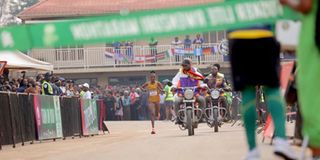Premium
Kenyans flock to Uganda for Rwenzori Marathon, but fail to beat locals

Emily Chebet heads for the finishing line during the Tusker Lite Rwenzori Marathon.
What you need to know:
- Certification from the leading athletics body will allow Ugandan runners to qualify for the world’s top races without leaving the country, lifting an accessibility barrier for runners without means to travel.
- “For Joshua Cheptegei, for example, to qualify for the Olympics, he had to fly to other countries to run,” says Martin Mugarra Bahinduka, minister of state for tourism, wildlife, and antiquities, referring to the decorated Ugandan Olympian and world-record holder for the 5,000m and 10,000m events. “Now, a young man from Kasese can attempt qualifying for international marathons, including the Olympics,” says Mr Bahinduka.
It may be sponsored by a Kenyan beer, but there’s no doubt this race is Ugandan. And Tusker isn’t the only Kenyan footprint on the Tusker Lite Rwenzori Marathon, in the mountains that separate Western Uganda from Democratic Republic of the Congo.
More than 400 Kenyans have flocked to Western Uganda for this event, now in its third year and attracting more than 3,600 runners from 33 countries.
While Tanzanians and Rwandans are also present—and a Somalia t-shirt peeks out of the crowd—Kenyans are by far the largest contingent.
They let out a raucous cheer when name-checked at the round of speeches at the end of the race and can be seen partying with the best of the crowd at the after-party that stretches long into the night.
For Raymond Otieno of Nairobi—representing Swamp Runners and a host of other clubs—the main draw was that this is the only marathon in the world to cross the equator. He clocked a respectable 3:17 time on the 42-kilometre course.
“It is hillier compared to the Kilimanjaro Marathon or the Nairobi Marathon,” Mr Otieno said after the race. Indeed, the course is one of the major draws of this race, which meanders through elephant and lion territory next to Queen Elizabeth National Park before turning sharply up into the hills of the Rwenzori Mountains. “It’s amazing, but tough,” says Josiah Baraka of Nairobi, representing Ubuntu Running Club.

From left: Kenyans Raymond Otieno, Josiah Baraka, Njuguna Washira during the Tusker Lite Rwenzori Marathon.
Another Kenyan, Dr Njuguna Washira of Nakuru and the Menengai Runners has more than the race on his mind. Dr. Washira was quick to pull out his phone to show photos from a game drive through Queen Elizabeth, where he was very impressed by the quality of wildlife on display, especially hippos.
The Kenyan contingent in Kasese, the home of this marathon, is playing right into the hands of organisers. The number of visitors coming to Kasese has ballooned since the race began in 2022 with just 800 runners from four countries.
In the process, tourism has been boosted in this corner of Uganda battered by conflict, disease—including the first mpox cases in the country—and climate change.
What Kenyans have been unable to do is unseat local Ugandan competition. Along with increasing travel to Uganda—which has for years fallen behind its neighbours in terms of tourism—the Rwenzori Marathon has also notched a milestone in Uganda’s sporting ambitions.
The 2024 event is the first in the country to be certified by World Athletics, a classification that means runners can use the Rwenzori Marathon to qualify for elite marathons and prestigious international races.
“This puts Uganda on a very different level,” says Amos Wekesa, the organiser of the marathon and an operator of tourism businesses across East Africa. “A lot of the runners are partly coming to qualify for so many races across the continent.”
Indeed, Ugandans dominated. The top three male finishers for the full marathon were Abel Chelangat—with a time of 2:14:59—Julius Ochieng, and Allan Andiema. Only one Kenyan man cracked the top 20, Ndu Gu Isaiah, who placed 12th.
Among the women, it was the same trend, with the top three finishers, Emily Chebet—who clocked in at 2:42:08—Ruth Cheptoyek, and Scarlet Chemos all being Ugandan, with Wendy Migael being the highest-placed female Kenyan marathoner in twelfth. It was much the same for the half marathon, with all podium finishers being Ugandan.
World Athletics certification should help Uganda in challenging the well-established dominance of Kenya in long-distance running—at a time of angst in Nairobi and beyond amid allegations that officials are shepherding young talent to wealthier nations.
Certification from the leading athletics body will allow Ugandan runners to qualify for the world’s top races without leaving the country, lifting an accessibility barrier for runners without means to travel.
“For Joshua Cheptegei, for example, to qualify for the Olympics, he had to fly to other countries to run,” says Martin Mugarra Bahinduka, minister of state for tourism, wildlife, and antiquities, referring to the decorated Ugandan Olympian and world-record holder for the 5,000m and 10,000m events.
“Now, a young man from Kasese can attempt qualifying for international marathons, including the Olympics,” says Mr Bahinduka.





